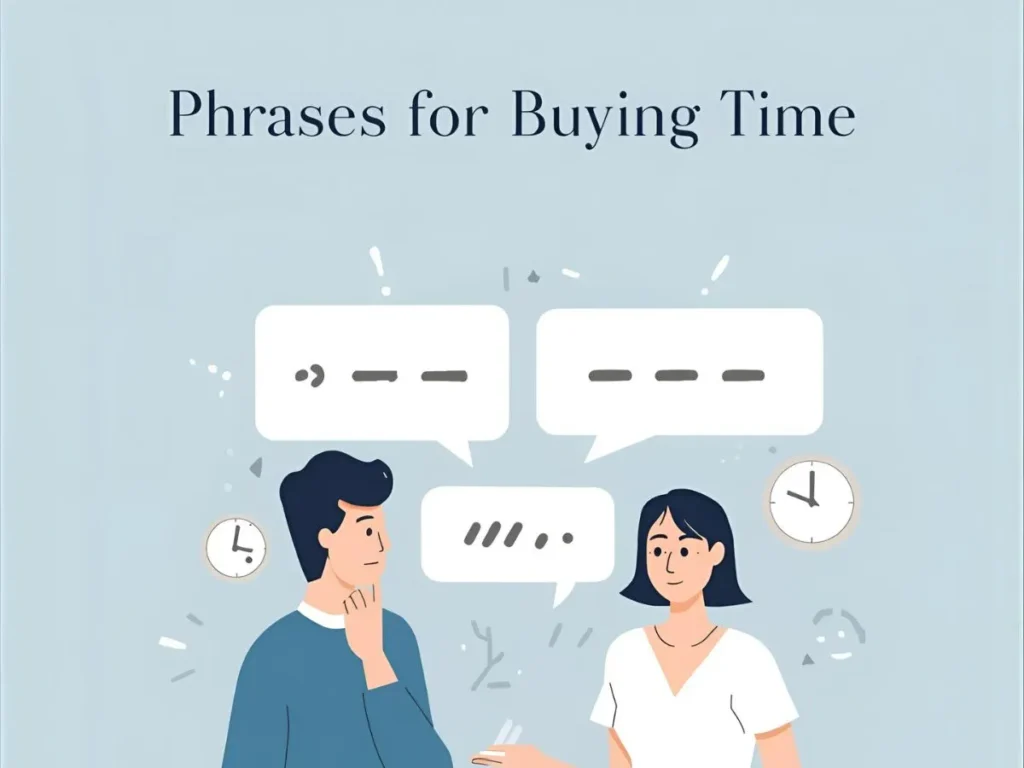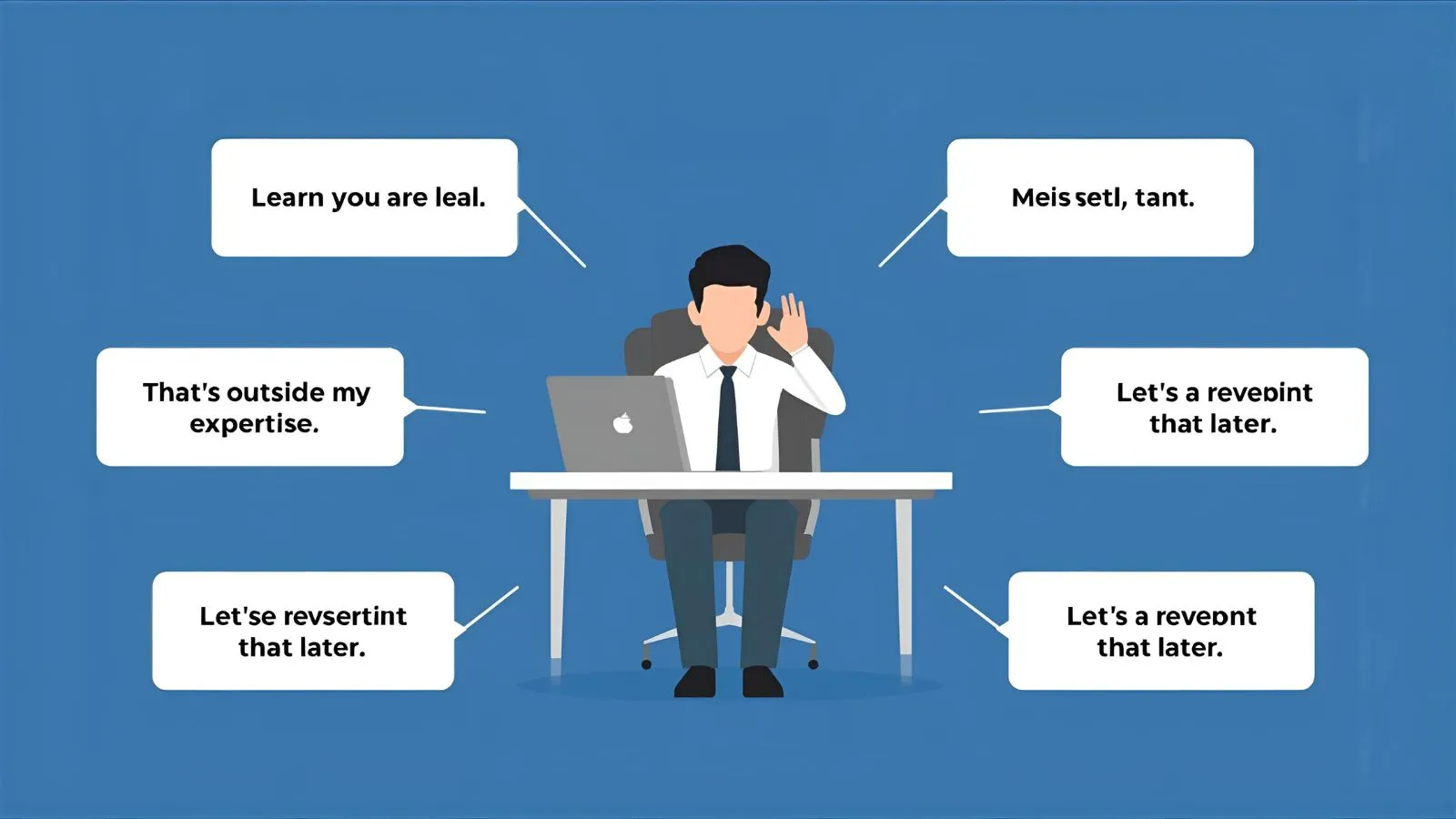When someone asks you something you’d rather not — you might be tempted to just stay silent or change the topic entirely. But there’s a more polished way: using phrases for avoiding answering a question.
These are polite, indirect, or strategic ways of sidestepping a direct answer without offending or shutting down dialogue.
Whether you’re in a business meeting, a casual chat, or facing a personal question you’d rather skip, knowing how to deploy such phrases gives you control and composure. I
n this article, we’ll explore why these phrases matter, and then walk through different categories of them with examples and tips.
By the end, you’ll have a toolkit of ways to respond gracefully when you’d rather not answer.
Why It Matters
Using phrases for avoiding answering a question matters for several reasons:
- Protecting boundaries. Sometimes the question is too personal, too early in a relationship, or just outside your comfort zone. A well-chosen phrase helps you safeguard your privacy. For instance, when someone asks about your salary or family issues, you might say something like “I’d rather not say” rather than being forced into an uncomfortable explanation. engoo.com+1
- Maintaining professionalism. In business or legal contexts you might legitimately cannot share certain information (confidentiality, legal policy, etc.). Phrases like “I’m not at liberty to say” give you an out without sounding evasive. Espresso English+1
- Buying time or avoiding commitment. Sometimes you just need time to find an answer or you’re not ready to commit. Instead of “I don’t know” (which can sound weak), you might say “I’ll have to get back to you.” That keeps bridges open. English Lesson via Skype+1
- Managing delicate social situations. When you’re dealing with intrusive or nosy questions, change the topic or redirect is sometimes the kinder way. Many self-help guides suggest phrasing like “That’s a little too personal to go into right now.” English with Kim
In short: knowing how to use phrases for avoiding answering a question gives you more control, preserves social harmony, and helps you avoid saying something you’ll regret or that you weren’t ready to share.
1. ⏳ Phrases for Buying Time

When you don’t have an immediate answer or you’d like to delay, these are your allies.
1.1 “I’ll have to get back to you.”
Explanation: You’re acknowledging the question, but not committing to an immediate answer.
Use when: You need time to check facts, think, or consult others.
Example: “Can you provide the final numbers for the quarter?” — “Good question. I’ll have to get back to you with that.”
1.2 “I’ll see what I can do.”
Explanation: Signals that you’re not promising a full yes, but you’ll look into it.
Use when: Someone asks for something that you’re willing to consider but haven’t decided yet.
Example: “Could you adjust the schedule for the meeting?” — “Sure — I’ll see what I can do and let you know.”
1.3 “I’m not sure yet…”
Explanation: Humble way to show you don’t have the answer right away — without sounding evasive.
Use when: You genuinely don’t know, or you want to avoid giving a half-baked response.
Example: “What’s the budget for next year?” — “I’m not sure yet — we’re still finalising it.”
1.4 “Let me think about that.”
Explanation: You’re indicating you need some time to reflect before replying.
Use when: The question is complex, sensitive, or you want to craft a thoughtful answer.
Example: “Would you like to lead this project?” — “Thanks for asking. Let me think about that and I’ll let you know soon.”
2. 🛑 Phrases for Declining to Answer

Sometimes you just won’t answer — and that’s okay. These phrases let you do so politely.
2.1 “I’d rather not say.”
Explanation: A soft refusal — you’re expressing your preference not to talk about it. English Lesson via Skype+1
Use when: The question is personal, sensitive, or you simply don’t want to share.
Example: “How much did you pay for your car?” — “I’d rather not say.”
2.2 “That’s personal.”
Explanation: Direct but polite: you’re signalling a topic is off-limits. Espresso English
Use when: The topic crosses into your private life or emotional territory.
Example: “How many relationships have you been in?” — “That’s personal — let’s talk about something else.”
2.3 “I’m not in a position to answer that.”
Explanation: Useful in professional or formal settings when you lack authority or permission. English Lesson via Skype+1
Use when: You legitimately don’t have the responsibility or authority to respond.
Example: “What will the company’s policy change look like?” — “I’m not in a position to answer that right now.”
2.4 “I’m sorry, but that’s confidential.”
Explanation: Signals legal, regulatory, or trust-based reason for not sharing. oxfordlanguageclub.com
Use when: The information is restricted or you’re bound by privacy obligations.
Example: “What’s the profit margin on this product?” — “I’m sorry, but that’s confidential.”
3. 🔄 Phrases for Redirecting or Deflecting
You don’t answer the question — you shift it gently, or turn it back.
3.1 “That’s an interesting question — what made you ask it?”
Explanation: You’re deflecting by exploring the asker’s motive and shifting focus. engoo.com+1
Use when: Someone asks something you’d rather not answer, but you want to keep the dialogue going.
Example: “Why did you leave your last job so quickly?” — “That’s an interesting question — what made you ask?”
3.2 “Let’s just say…”
Explanation: You give a vague answer without details, and then change topic. engoo.com+1
Use when: You want to respond but stay deliberately non-specific.
Example: “How much are you spending on renovations?” — “Let’s just say it cost more than we planned. Anyway, how’s your new place coming along?”
3.3 “I’m sorry, but I don’t want to get into that right now.”
Explanation: A polite way to signal “No thanks” while preserving relationship. English with Kim
Use when: You’re asked something you’d rather skip, but want to stay polite.
Example: “How are things with your partner?” — “I’m sorry, but I don’t want to get into that right now.”
4. 🎭 Phrases for Being Vague or Non-Committal
When you don’t want to refuse outright, but you also don’t want to give a clear answer.
4.1 “It’s out of my hands.”
Explanation: You indicate you have no control over the matter. English Lesson via Skype+1
Use when: The decision is made by someone else, you’re acknowledging that.
Example: “Will the project deadline be extended?” — “I’m afraid it’s out of my hands — I’ll find out for you.”
4.2 “I can’t say for certain.”
Explanation: You express uncertainty rather than commitment. English Lesson via Skype+1
Use when: You believe you don’t know enough yet or you want to hedge your response.
Example: “Do you think you’ll attend the event next week?” — “I can’t say for certain yet — I’ll let you know soon.”
4.3 “Let’s wait and see.”
Explanation: You defer giving an answer until later when more is known. Espresso English+1
Use when: Outcome is uncertain or you want to delay.
Example: “Will the company hire more staff this year?” — “Let’s wait and see how things play out.”
5. 🧠 Phrases for Appearing Thoughtful

Sometimes you want to maintain image, show that you considered the question carefully, even if you’re not answering fully.
5.1 “That merits some thought.”
Explanation: You show you’re reflecting before answering (even if you may not).
Use when: You want to appear considerate and avoid a rushed answer.
Example: “What’s your biggest weakness?” — “That merits some thought — can I circle back to it in a moment?”
5.2 “I’d prefer to keep that under review.”
Explanation: You hint at future consideration, without committing.
Use when: You’re in decision-mode or negotiation and want time.
Example: “What compensation are you looking for?” — “I’d prefer to keep that under review and get back to you.”
5.3 “There are many factors to consider.”
Explanation: You show complexity and imply you can’t give a simple answer right now.
Use when: The question is complicated, multi-layered, or you don’t want to oversimplify.
Example: “Will we meet our sales target this quarter?” — “There are many factors to consider, so we’ll monitor it closely.”
Final Thoughts (Conclusion)
So, in conclusion, mastering phrases for avoiding answering a question is more than just dodging — it’s about navigating conversation smartly, preserving your boundaries, and maintaining your image.
Whether you need to buy time, decline politely, redirect, stay vague, or appear thoughtful, you now have a range of phrases to choose from.
Use them with sincerity and awareness — the tone, context, and your body-language matter just as much as the words.
Actionable advice:
- Pick two or three phrases from above that feel natural to you.
- Practice them in front of a mirror or with a friend until they feel comfortable.
- Use them with a calm, steady voice and kindly expression — you’ll be far more effective than using a hurried or defensive tone.
- Remember: avoiding answering is fine — just avoid being rude or dismissive. A well-timed phrase for avoiding answering a question can protect your privacy and keep relationships intact.
By practising these phrases, you’ll feel more confident when you’re faced with questions you’d rather not answer — and you’ll do so gracefully and wisely.
Bonus Recap Table
| Category | Phrase | Use When | Example |
|---|---|---|---|
| Buying Time | “I’ll have to get back to you.” | Need to check or think | “Good question. I’ll have to get back to you with that.” |
| Buying Time | “Let me think about that.” | Complex or unexpected question | “Would you like to lead this project? Let me think about that.” |
| Declining | “I’d rather not say.” | Personal/sensitive topic | “How much did you pay for your car?” “I’d rather not say.” |
| Declining | “That’s confidential.” | Legal/official restrictions | “What’s your margin?” “I’m sorry, but that’s confidential.” |
| Redirecting | “That’s an interesting question — what made you ask it?” | Avoid but engage | “Why did you leave your last job?” “That’s an interesting question …” |
| Redirecting | “Let’s just say…” | Provide vague hint + change topic | “How much are you spending?” “Let’s just say it cost more than we planned. Anyway…” |
| Vagueness | “I can’t say for certain.” | Uncertain/unfinished | “Will you attend next week?” “I can’t say for certain yet.” |
| Vagueness | “Let’s wait and see.” | Outcome unknown | “Will the company hire more staff?” “Let’s wait and see how things play out.” |
| Thoughtful | “That merits some thought.” | Show you’re reflective | “What’s your biggest weakness?” “That merits some thought …” |
| Thoughtful | “There are many factors to consider.” | Complex situation | “Will we meet our sales target?” “There are many factors to consider.” |


Leave a Reply